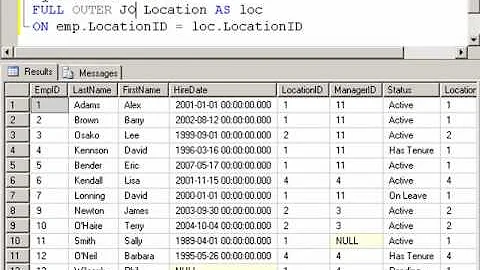GROUP BY and COUNT in PostgreSQL
Solution 1
I think you just need COUNT(DISTINCT post_id) FROM votes.
See "4.2.7. Aggregate Expressions" section in http://www.postgresql.org/docs/current/static/sql-expressions.html.
EDIT: Corrected my careless mistake per Erwin's comment.
Solution 2
There is also EXISTS:
SELECT count(*) AS post_ct
FROM posts p
WHERE EXISTS (SELECT FROM votes v WHERE v.post_id = p.id);
In Postgres and with multiple entries on the n-side like you probably have, it's generally faster than count(DISTINCT post_id):
SELECT count(DISTINCT p.id) AS post_ct
FROM posts p
JOIN votes v ON v.post_id = p.id;
The more rows per post there are in votes, the bigger the difference in performance. Test with EXPLAIN ANALYZE.
count(DISTINCT post_id) has to read all rows, sort or hash them, and then only consider the first per identical set. EXISTS will only scan votes (or, preferably, an index on post_id) until the first match is found.
If every post_id in votes is guaranteed to be present in the table posts (referential integrity enforced with a foreign key constraint), this short form is equivalent to the longer form:
SELECT count(DISTINCT post_id) AS post_ct
FROM votes;
May actually be faster than the EXISTS query with no or few entries per post.
The query you had works in simpler form, too:
SELECT count(*) AS post_ct
FROM (
SELECT FROM posts
JOIN votes ON votes.post_id = posts.id
GROUP BY posts.id
) sub;
Benchmark
To verify my claims I ran a benchmark on my test server with limited resources. All in a separate schema:
Test setup
Fake a typical post / vote situation:
CREATE SCHEMA y;
SET search_path = y;
CREATE TABLE posts (
id int PRIMARY KEY
, post text
);
INSERT INTO posts
SELECT g, repeat(chr(g%100 + 32), (random()* 500)::int) -- random text
FROM generate_series(1,10000) g;
DELETE FROM posts WHERE random() > 0.9; -- create ~ 10 % dead tuples
CREATE TABLE votes (
vote_id serial PRIMARY KEY
, post_id int REFERENCES posts(id)
, up_down bool
);
INSERT INTO votes (post_id, up_down)
SELECT g.*
FROM (
SELECT ((random()* 21)^3)::int + 1111 AS post_id -- uneven distribution
, random()::int::bool AS up_down
FROM generate_series(1,70000)
) g
JOIN posts p ON p.id = g.post_id;
All of the following queries returned the same result (8093 of 9107 posts had votes).
I ran 4 tests with EXPLAIN ANALYZE ant took the best of five on Postgres 9.1.4 with each of the three queries and appended the resulting total runtimes.
As is.
-
After ..
ANALYZE posts; ANALYZE votes; -
After ..
CREATE INDEX foo on votes(post_id); -
After ..
VACUUM FULL ANALYZE posts; CLUSTER votes using foo;
count(*) ... WHERE EXISTS
- 253 ms
- 220 ms
- 85 ms -- winner (seq scan on posts, index scan on votes, nested loop)
- 85 ms
count(DISTINCT x) - long form with join
- 354 ms
- 358 ms
- 373 ms -- (index scan on posts, index scan on votes, merge join)
- 330 ms
count(DISTINCT x) - short form without join
- 164 ms
- 164 ms
- 164 ms -- (always seq scan)
- 142 ms
Best time for original query in question:
- 353 ms
For simplified version:
- 348 ms
@wildplasser's query with a CTE uses the same plan as the long form (index scan on posts, index scan on votes, merge join) plus a little overhead for the CTE. Best time:
- 366 ms
Index-only scans in the upcoming PostgreSQL 9.2 can improve the result for each of these queries, most of all for EXISTS.
Related, more detailed benchmark for Postgres 9.5 (actually retrieving distinct rows, not just counting):
Solution 3
Using OVER() and LIMIT 1:
SELECT COUNT(1) OVER()
FROM posts
INNER JOIN votes ON votes.post_id = posts.id
GROUP BY posts.id
LIMIT 1;
Solution 4
WITH uniq AS (
SELECT DISTINCT posts.id as post_id
FROM posts
JOIN votes ON votes.post_id = posts.id
-- GROUP BY not needed anymore
-- GROUP BY posts.id
)
SELECT COUNT(*)
FROM uniq;
Related videos on Youtube
skinkelynet
Updated on July 09, 2022Comments
-
skinkelynet almost 2 years
The query:
SELECT COUNT(*) as count_all, posts.id as post_id FROM posts INNER JOIN votes ON votes.post_id = posts.id GROUP BY posts.id;Returns
nrecords in Postgresql:count_all | post_id -----------+--------- 1 | 6 3 | 4 3 | 5 3 | 1 1 | 9 1 | 10 (6 rows)I just want to retrieve the number of records returned:
6.I used a subquery to achieve what I want, but this doesn't seem optimum:
SELECT COUNT(*) FROM ( SELECT COUNT(*) as count_all, posts.id as post_id FROM posts INNER JOIN votes ON votes.post_id = posts.id GROUP BY posts.id ) as x;How would I get the number of records in this context right in PostgreSQL?
-
Samson almost 12 yearsWhy would you think it's not optimum?
-
skinkelynet almost 12 yearsThis would seem like an operation so common there would be an easier way.
-
rogerdpack over 2 yearsdoes
SELECT COUNT(*) from POSTSwork in your case?
-
-
skinkelynet almost 12 yearsPG::Error: ERROR: column "posts.id" must appear in the GROUP BY clause or be used in an aggregate function
-
Erwin Brandstetter almost 12 years@skinkelynet: that's because the answer is subtly wrong - it has to be
FROM votes. I added the correct form to my answer. -
 a_horse_with_no_name almost 12 yearsWhat do you mean with "more portable"?
a_horse_with_no_name almost 12 yearsWhat do you mean with "more portable"? -
Erwin Brandstetter almost 12 years@a_horse_with_no_name: "more portable" was nonsense, really. Removed that bit, thanks for pointing out. I was under the wrong impression that SQLite would not support
DISTINCTin aggregate functions. Turns out, it does - just as all other major RDBMS. As compensation (and because I wanted to clarify that for myself) I elaborate on the performance angle with a benchmark. -
wildplasser almost 12 yearsIf I read correctly, you missed my CTE-version. It should be equivalent to a subquery, though.
-
Erwin Brandstetter almost 12 years@wildplasser: Sorry, recreated the scenario (not identical, but close as can be seen from the setup) and added the result for the CTE version. As expected, a CTE doesn't help performance here.
-
Steve Jorgensen over 3 years@LostCrotchet It turns out you can do that in PostgreSQL. You need to put the list of fields in parentheses, so for example…
SELECT COUNT(DISTINCT (firstname, lastname)) FROM people. -
stefansundin over 2 yearsThis is what worked for my case since I wanted to filter out things with a
HAVING SUM(..) > 5clause that summed values across rows.







